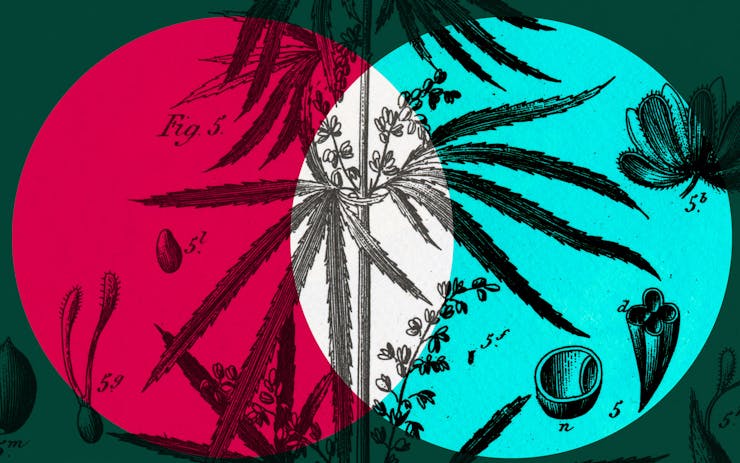Cannabis nerds and the healthcare community are right to be excited about cannabidiol, better known as CBD, one of many cannabinoids found in the cannabis plant.
There are a few reasons why CBD has become so trendy, and evolving attitudes towards the cannabis plant and new, illuminating research are two.
But CBD is also plant-derived and non-impairing—it is a seemingly innocuous substance with subtle effects, and that makes it a ripe ingredient for the ignorant and the unscrupulous to overemphasize its effectiveness.
CBD can feel like a miracle for some and life-changing for others, and scientific journals and the cannabis community alike are filled with praise for its anti-inflammatory and seizure-reducing effects. But it can also be disappointing, and for some it can be downright harmful. So put down that $9 CBD-infused water and read this before you buy into the CBD craze.
Myth: CBD is the only solution
According to the World Health Organization, CBD “is generally well-tolerated with a good safety profile,” but it’s not for everyone. CBD or cannabis-derived medicines can have contraindications with other drugs and can have side effects. A 2017 review of CBD studies said the most commonly reported are fatigue, diarrhea, and appetite or weight changes.
If you want to try treating a serious medical issue such as epilepsy with CBD, talk to a doctor. If you want to try treating common but difficult issues like anxiety or insomnia, the answer is the same: please see a doctor. If your family doctor doesn’t feel comfortable with cannabinoids, consult a doctor who is, and bring your medical records detailing your history with you.
Why? A few things: for one, CBD may not be your first line of defence. Even if your symptoms are common, your body might be deficient in a vitamin or could need more exercise or something far less expensive than CBD. Locate the source of the problem first, and ask for guidance on how to measure and track your progress.
Myth: Hemp oil is CBD-rich
Hippies and natural beauty folk have been slathering ultra-moisturizing hemp seed oil on their skin for a long time—it’s wonderful stuff. But hemp seed oil is being repackaged as far-more-expensive CBD topical creams and edibles, even though not all hemp products contain CBD—in fact, most don’t! Or shouldn’t, anyway.
Before buying a purported CBD product, look to ensure that the seller has a license to do so—that’s your first clue. Hemp seed oil merchants do not require a licence. CBD sellers do.
Why is this so confusing? Because CBD can be derived from hemp. Actually, CBD and THC have inverse relationships, according to the US Hemp Authority, and hemp is simply ultra-low THC cannabis (<0.3%) grown outdoors. But at this point in time, most Canadian hemp genetics don’t contain much CBD—until 2019, Canadian hemp could only be legally cultivated for seed, oil, and fibre. And even when CBD is derived from hemp, it’s not coming from the seeds which only contain trace amounts of CBD.
Once you’re shopping with a licensed retailer, look at the ingredients and lab results. Make sure cannabidiol is among them—not a picture of a cannabis leaf, but actually listed on the label.
Myth: CBD is legal everywhere
In Canada, cannabidiol is legal but it is still a controlled substance under the Cannabis Act, so again, avoid the convenience store counter CBD oils.
And while it can be liberating and convenient to bring cannabis products on domestic flights, you can’t leave Canada with them, and you can face some harsh consequences at the US border where cannabis is federally illegal. Leave your CBD at home if you’re travelling internationally.
Myth: CBD is not psychoactive
Everyone needs to stop saying that CBD isn’t psychoactive—if it wasn’t psychoactive, then why are so many people with mood disorders singing its praises? It does affect the brain, it is psychoactive, but it doesn’t impair your responses or brain activity like THC does. You won’t feel high. A better way to put it is that CBD is not intoxicating.
Myth: CBD is great for pain and insomnia
Everyone also needs to stop saying CBD is good for pain and insomnia. It can be—but more likely it helps with pain and insomnia in a roundabout way, by treating the root cause of the problem, for instance inflammation or anxiety.
While some people benefit from CBD on its own—for example, Epidiolex is a cannabis-derived prescription CBD for epilepsy—a dose of CBD likely won’t have instantaneous pain-relieving effects or cause sudden sleepiness. When a particular CBD-dominant product does produce sleepy effects, it’s likely that it contains myrcene, a potentially sedating terpene.
Is it fear of being high that encourages us to assume the non-intoxicating cannabinoid is the most universally effective? Is it the stigma associated with drug consumption? At any rate, if your CBD-only regime isn’t working for you, ask your doctor about full spectrum or whole plant medicine, and how THC and terpenes together to create what Dr. Ethan Russo coined the entourage effect.
Myth: A little CBD goes a long way
CBD-infused edibles and topicals are coming to a cannabis store near you in December 2019. But before you try using them to heal all that ails you, see the advice above and visit your doctor, or better yet, a cannabis-savvy doctor (they’re not always the same person).
Dr. Dustin Sulak reports that some of his patients report feeling better after consuming as little as 2 mg of CBD, but even the most conservative scientific studies conducted on mice have started with a minimum of 10 mg (to a maximum of 2100 mg in the 2017 review of studies).
Be sure to check the dosage information on your products—and check your expectations, too.





